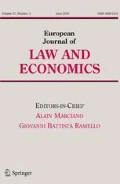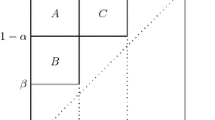Abstract
Using a simple bilateral trading example with discrete valuations and costs it is demonstrated that in the presence of private information the efficiency of Coasean bargaining may be strictly enhanced if initially no property rights are assigned.
Similar content being viewed by others
References
Coase, R. H. 1960. “The Problem of Social Cost.” Journal of Law and Economics 3, 1–44.
Cramton, P., Gibbons, R., & Klemperer, P. 1987. “Dissolving a Partnership Efficiently.” Econometrica 55, 615–632.
Fudenberg, D. & Tirole, J. 1991. Game Theory, Cambridge: MIT Press.
Illing, G. 1992. “Private Information as Transaction Costs: The Coase Theorem Revisited.” Journal of Institutional and Theoretical Economics 148, 558–576.
Lewis, T. & Sappington, D. 1989. “Countervailing Incentives in Agency Relationships.” Journal of Economic Theory 49, 294–313.
Matsuo, T. 1989. “On Incentive Compatible, Individual Rational, and Ex Post Efficient Mechanisms for Bilateral Trading.” Journal of Economic Theory 49, 189–194.
Medema, S. G. 1999. “Legal Fiction: The Case of the Coase Theorem in Law and Economics.” Economics and Philosophy 15, 209–233.
Mercuro, N. & Medema, S. G. 1997. Economics and the Law: From Posner to Post-Modernism, Princeton University Press.
Myerson, R. B. 1982. “Optimal Coordination Mechanisms in Generalized Principal-Agent Problems.” Journal of Mathematical Economics 10, 67–81.
Myerson, R. B. & Satterthwaite, M. A. 1983. “Efficient Mechanisms for Bilateral Trading.” Journal of Economic Theory 29, 265–281.
Samuelson, W. 1984. “A Comment on the Coase Theorem.” In A. E. Roth ed., Game-Theoretic Models of Bargaining, Cambridge University Press, 321–339.
Schiff, M. 1995. “Uncertain Property Rights and the Coase Theorem.” Rationality and Society 7, 321–327.
Schmitz, P. W. 2000. “Simple Contracts, Renegotiation Under Asymmetric Information, and the Hold-Up Problem.” European Economic Review, forthcoming.
Schweizer, U. 1988. “Externalities and the Coase Theorem: Hypothesis or Result?” Journal of Institutional and Theoretical Economics 144, 245–266.
Usher, D. 1998. “The Coase Theorem is Tautological, Incoherent or Wrong.” Economics Letters 61, 3–11.
Author information
Authors and Affiliations
Rights and permissions
About this article
Cite this article
Schmitz, P.W. The Coase Theorem, Private Information, and the Benefits of Not Assigning Property Rights. European Journal of Law and Economics 11, 23–28 (2001). https://doi.org/10.1023/A:1008709628107
Issue Date:
DOI: https://doi.org/10.1023/A:1008709628107




